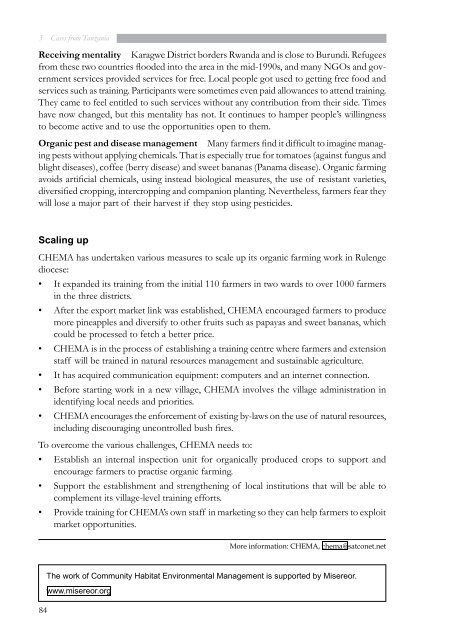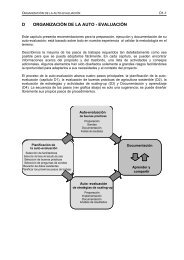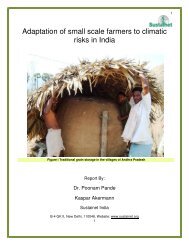cases from tanzania - Sustainet
cases from tanzania - Sustainet
cases from tanzania - Sustainet
Create successful ePaper yourself
Turn your PDF publications into a flip-book with our unique Google optimized e-Paper software.
3 Cases <strong>from</strong> Tanzania<br />
Receiving mentality Karagwe District borders Rwanda and is close to Burundi. Refugees<br />
<strong>from</strong> these two countries flooded into the area in the mid-1990s, and many NGOs and government<br />
services provided services for free. Local people got used to getting free food and<br />
services such as training. Participants were sometimes even paid allowances to attend training.<br />
They came to feel entitled to such services without any contribution <strong>from</strong> their side. Times<br />
have now changed, but this mentality has not. It continues to hamper people’s willingness<br />
to become active and to use the opportunities open to them.<br />
Organic pest and disease management Many farmers find it difficult to imagine managing<br />
pests without applying chemicals. That is especially true for tomatoes (against fungus and<br />
blight diseases), coffee (berry disease) and sweet bananas (Panama disease). Organic farming<br />
avoids artificial chemicals, using instead biological measures, the use of resistant varieties,<br />
diversified cropping, intercropping and companion planting. Nevertheless, farmers fear they<br />
will lose a major part of their harvest if they stop using pesticides.<br />
scaling up<br />
CHEMA has undertaken various measures to scale up its organic farming work in Rulenge<br />
diocese:<br />
• It expanded its training <strong>from</strong> the initial 110 farmers in two wards to over 1000 farmers<br />
in the three districts.<br />
• After the export market link was established, CHEMA encouraged farmers to produce<br />
more pineapples and diversify to other fruits such as papayas and sweet bananas, which<br />
could be processed to fetch a better price.<br />
• CHEMA is in the process of establishing a training centre where farmers and extension<br />
staff will be trained in natural resources management and sustainable agriculture.<br />
• It has acquired communication equipment: computers and an internet connection.<br />
• Before starting work in a new village, CHEMA involves the village administration in<br />
identifying local needs and priorities.<br />
• CHEMA encourages the enforcement of existing by-laws on the use of natural resources,<br />
including discouraging uncontrolled bush fires.<br />
To overcome the various challenges, CHEMA needs to:<br />
• Establish an internal inspection unit for organically produced crops to support and<br />
encourage farmers to practise organic farming.<br />
• Support the establishment and strengthening of local institutions that will be able to<br />
complement its village-level training efforts.<br />
• Provide training for CHEMA’s own staff in marketing so they can help farmers to exploit<br />
market opportunities.<br />
84<br />
More information: CHEMA, chema@satconet.net<br />
The work of Community Habitat Environmental Management is supported by Misereor.<br />
www.misereor.org




